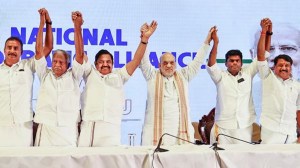Empowered committee moots GST design changes
NIPFP tasked with recommending a revenue-neutral tax rate.
NIPFP tasked with recommending a revenue-neutral tax rate.
The empowered committee of state finance ministers on Friday resolved to consider a host of fresh proposals,which would enable the structure of the proposed goods and services tax GST to take shape.
These include raising the exemption threshold from what was proposed earlier for the benefit of small businesses and introducing the concept of compensatory value-added tax CVAT for inter-state trade in lieu of the integrated GST I-GST proposed earlier.
The panel also asked Delhi-based think tank National Institute of Public Finance and Policy NIPFP to recommend a revenue-neutral rate RNR for GST. This is against the backdrop of several earlier suggestions for RNR that ranged from 12-24 per cent. Since the states would be in position to tax services after the introduction of GST regime,it was also agreed that exempted list would be common for services too.
The committee,led by Bihar deputy chief minister Sushil Kumar Modi,reviewed the proposals given by three sub-panels and suggested that states consider fixing the annual turnover threshold for GST at Rs 25 lakh.
The Rs 10-lakh threshold contemplated earlier can be raised in view of inflation. A decision is yet to be taken, Modi said after the meeting.
It is expected that the threshold may be kept somewhere between Rs 10 lakh and Rs 25 lakh as 65 per cent of traders will go out of GST if states endorse Rs 25 lakh as the threshold.
The committee also proposed a slightly lower threshold for northeastern states compared with others. Currently,traders in most states with an annual turnover less than Rs 5 lakh need not register for tax purposes under the state VAT system.
The Empowered Committees meeting also decided that HSN Code Harmonized system of Nomenclature Code should be adopted for classifying the goods. This code is in use only in Kerala. Gulati Institute has been asked to work for HSN code, Modi said.
As for taxation of services,two different rates a standard rate and a lower merit rate are now being considered for GST,in lieu of one rate considered earlier.
While the merit rate would be the same for all states,the standard rate would be a floor rate with a narrow band,on which states could exercise some discretion. Modi said NIPFP will also recommend what the band should be.
- 01
- 02
- 03
- 04
- 05































